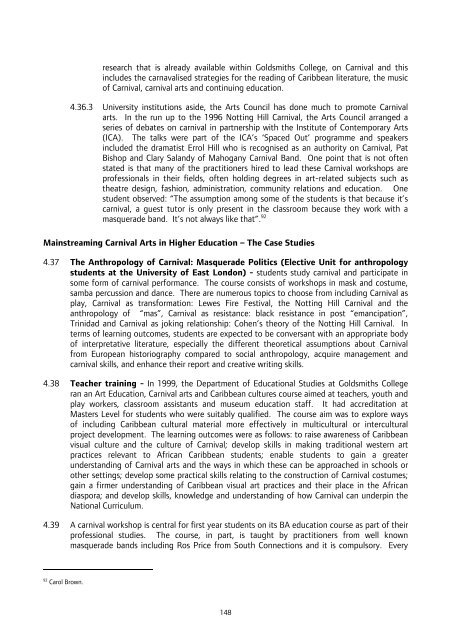Notting Hill Carnival Strategic Review - Intelligent Space
Notting Hill Carnival Strategic Review - Intelligent Space
Notting Hill Carnival Strategic Review - Intelligent Space
You also want an ePaper? Increase the reach of your titles
YUMPU automatically turns print PDFs into web optimized ePapers that Google loves.
esearch that is already available within Goldsmiths College, on <strong>Carnival</strong> and this<br />
includes the carnavalised strategies for the reading of Caribbean literature, the music<br />
of <strong>Carnival</strong>, carnival arts and continuing education.<br />
4.36.3 University institutions aside, the Arts Council has done much to promote <strong>Carnival</strong><br />
arts. In the run up to the 1996 <strong>Notting</strong> <strong>Hill</strong> <strong>Carnival</strong>, the Arts Council arranged a<br />
series of debates on carnival in partnership with the Institute of Contemporary Arts<br />
(ICA). The talks were part of the ICA’s ‘<strong>Space</strong>d Out’ programme and speakers<br />
included the dramatist Errol <strong>Hill</strong> who is recognised as an authority on <strong>Carnival</strong>, Pat<br />
Bishop and Clary Salandy of Mahogany <strong>Carnival</strong> Band. One point that is not often<br />
stated is that many of the practitioners hired to lead these <strong>Carnival</strong> workshops are<br />
professionals in their fields, often holding degrees in art-related subjects such as<br />
theatre design, fashion, administration, community relations and education. One<br />
student observed: “The assumption among some of the students is that because it’s<br />
carnival, a guest tutor is only present in the classroom because they work with a<br />
masquerade band. It’s not always like that”. 92<br />
Mainstreaming <strong>Carnival</strong> Arts in Higher Education – The Case Studies<br />
4.37 The Anthropology of <strong>Carnival</strong>: Masquerade Politics (Elective Unit for anthropology<br />
students at the University of East London) - students study carnival and participate in<br />
some form of carnival performance. The course consists of workshops in mask and costume,<br />
samba percussion and dance. There are numerous topics to choose from including <strong>Carnival</strong> as<br />
play, <strong>Carnival</strong> as transformation: Lewes Fire Festival, the <strong>Notting</strong> <strong>Hill</strong> <strong>Carnival</strong> and the<br />
anthropology of “mas”, <strong>Carnival</strong> as resistance: black resistance in post “emancipation”,<br />
Trinidad and <strong>Carnival</strong> as joking relationship: Cohen’s theory of the <strong>Notting</strong> <strong>Hill</strong> <strong>Carnival</strong>. In<br />
terms of learning outcomes, students are expected to be conversant with an appropriate body<br />
of interpretative literature, especially the different theoretical assumptions about <strong>Carnival</strong><br />
from European historiography compared to social anthropology, acquire management and<br />
carnival skills, and enhance their report and creative writing skills.<br />
4.38 Teacher training - In 1999, the Department of Educational Studies at Goldsmiths College<br />
ran an Art Education, <strong>Carnival</strong> arts and Caribbean cultures course aimed at teachers, youth and<br />
play workers, classroom assistants and museum education staff. It had accreditation at<br />
Masters Level for students who were suitably qualified. The course aim was to explore ways<br />
of including Caribbean cultural material more effectively in multicultural or intercultural<br />
project development. The learning outcomes were as follows: to raise awareness of Caribbean<br />
visual culture and the culture of <strong>Carnival</strong>; develop skills in making traditional western art<br />
practices relevant to African Caribbean students; enable students to gain a greater<br />
understanding of <strong>Carnival</strong> arts and the ways in which these can be approached in schools or<br />
other settings; develop some practical skills relating to the construction of <strong>Carnival</strong> costumes;<br />
gain a firmer understanding of Caribbean visual art practices and their place in the African<br />
diaspora; and develop skills, knowledge and understanding of how <strong>Carnival</strong> can underpin the<br />
National Curriculum.<br />
4.39 A carnival workshop is central for first year students on its BA education course as part of their<br />
professional studies. The course, in part, is taught by practitioners from well known<br />
masquerade bands including Ros Price from South Connections and it is compulsory. Every<br />
92<br />
Carol Brown.<br />
148








